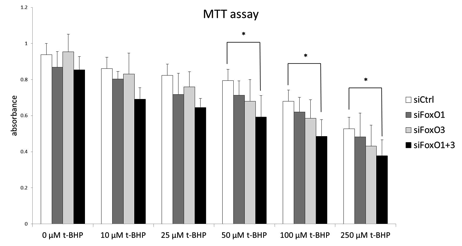Session Information
Session Type: Abstract Submissions (ACR)
Background/Purpose: Aging-associated changes in articular chondrocytes represent a major risk factor for osteoarthritis (OA). The major signaling pathway that regulates cellular aging is the Insulin/IGF-1/Pl3k/Akt/forkhead-box class O (FoxO) transcription factor axis. The FoxO factors play a central role in oxidative stress resistance regulating antioxidants, autophagy and protein quality control. Previously, we observed that FoxO factors are dysregulated in aged and OA cartilage. FoxO expression is reduced during the aging process and phosphorylation of FoxOs (inactivation form) is increased in OA cartilage. However, the impact of downregulated FoxOs on chondrocytes is still unknown. The objective of this study was to investigate the role of FoxOs in anti-oxidative stress resistance in human chondrocytes.
Methods: Normal human cartilage was obtained at autopsy from 4 adult donors. OA human cartilage was obtained from 5 patients undergoing knee replacement surgery. Small interference RNA for FoxO1 and FoxO3 were transfected into chondrocytes. The effects of down-regulated FoxO proteins on cell viability against the oxidant tert-Butyl hydroperoxide (t-BHP) were analyzed by MTT assay. Antioxidants and autophagy related proteins in FoxO-siRNA transfected cells were analyzed by Western blot. The changes in inflammatory mediators and extracellular matrix components following treatment with IL-1β or TGF-β were also examined.
Results: FoxO1 and FoxO3 but not FoxO4 mRNA expression was significantly lower in OA cartilage compared to normal cartilage. MTT assay showed that the combination of siFoxO1 and siFoxO3 significantly reduced cell viability compared to control siRNA under treatment with t-BHP (≥ 50 μM) (Figure 1). Knock-down of FoxO1 and FoxO1+3 resulted in significant reductions of GPX-1, catalase, LC3, Beclin1, p62, and Sirt1 proteins following treatment with t-BHP. Expression of iNOS was significantly increased in FoxO-siRNA transfected chondrocytes.
Conclusion: Down-regulated FoxO transcription factors in chondrocytes increased susceptibility to cell death induced by oxidative stress, and this was associated with reduced antioxidants and autophagy related proteins. Our data provide evidence for a key role of FoxO transcription factors as regulators of oxidative stress resistance in human chondrocytes.
Disclosure:
Y. Akasaki,
None;
M. K. Lotz,
None.
« Back to 2013 ACR/ARHP Annual Meeting
ACR Meeting Abstracts - https://acrabstracts.org/abstract/downregulated-forkhead-box-class-o-transcription-factors-attenuate-oxidative-stress-resistance-in-human-chondrocytes/

